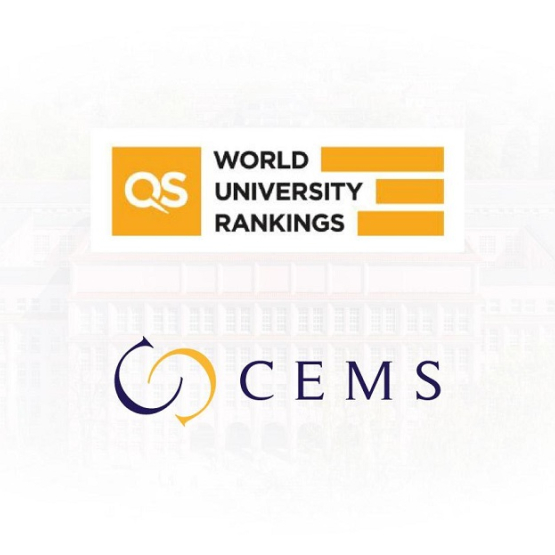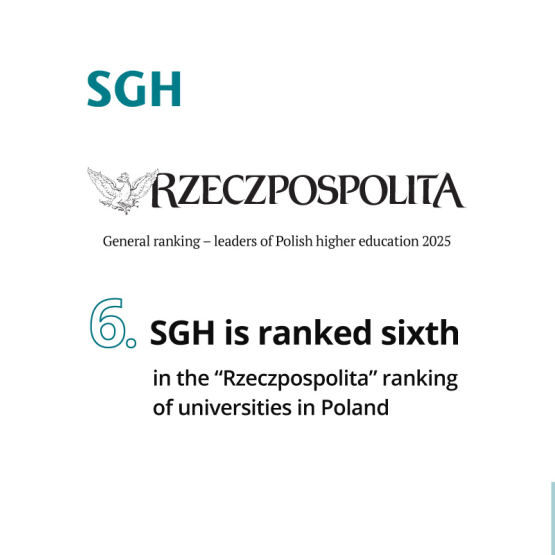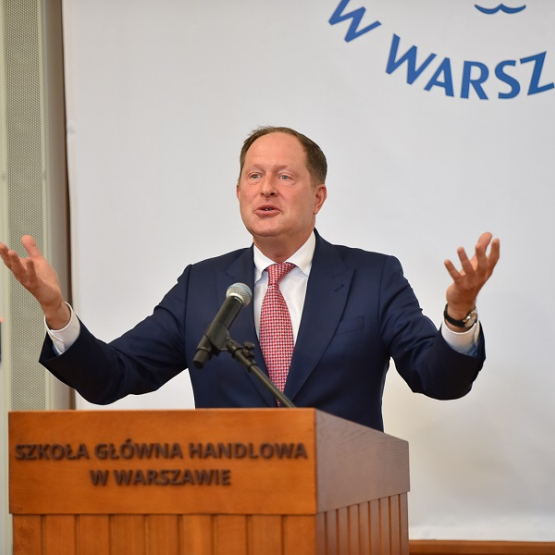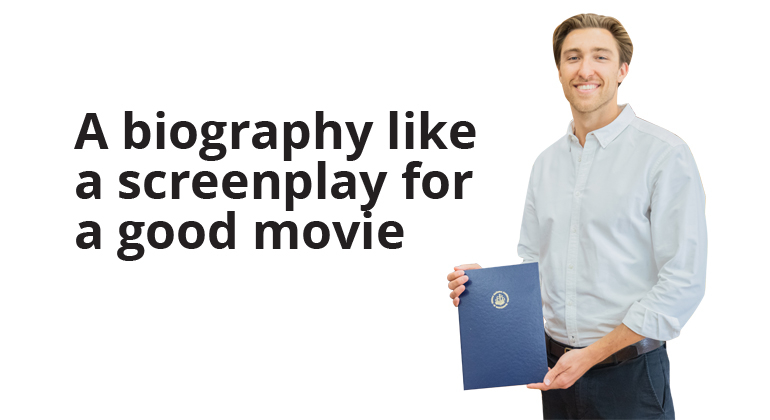
Jan Kozakiewicz, SGH Warsaw School of Economics student and the best breaststroke swimmer in Poland, interviewed by Magdalena Bryk
It’s quite a challenge to get even half an hour for an interview with you. A man of many natural talents and with a sort of ADHD – athlete, Olympian, Polish record holder, actor, SGH Warsaw School of Economics student, and air traffic controller. Janek, do you sleep at all?
I do. Quite a bit, actually. [laughs] Sleep is very important to me, and I try to sleep a minimum of 8.5 hours a day.
According to the official website of the TVP Sport channel, you are: “An actor, a devotee of the Rolling Stones, and an air traffic controller”. If you add “Olympic athlete”, “Polish record holder”, and “SGH student” to it, then your day would seem to be about 40 hours long! Let’s try to break your weekly routine down into pieces. How often do you work out? How many hours a week on average do you spend on training?
At present, I go to the pool three times a week and to the gym also three times a week (six units), but depending on the stage of preparation, I increase my training frequency to five times at the swimming pool and three times in the gym, to a maximum of eight training units per week.
Which is once a day on average… It’s not that much for a swimmer because, for example, my sister had trained twice a day already in her primary school days.
I had two training sessions a day back then too, and I found it to be totally counterproductive!
Definitely. She got discouraged and didn’t go back to swimming. And you had a break too, right? And what about work? What’s your work like? Is it 40 hours per week? Or is it some other system in the case of such a rare profession?
The air traffic controller profession involves a lot of responsibility, so you need a solid break before your next shift if you want to be able to focus 100% on the job. I work an average of 17 days a month. That leaves me with a lot of free time – which I take advantage of, of course, whenever I can.
That’s crazy! Plus, there’s studying (examination sessions in particular) and an improv group you’re a member of. Well, and 8.5 hours of sleep a day? How? If that’s really the case, I’m absolutely impressed by the level of your time-management skills, which must be the secret to your achievements.
Thank you!
I know that you’re actively involved in the BCA Flash improv group in your spare time. When I was looking for more information about you, I discovered that you perform… in theatre! Is this another passion of yours, or do people often confuse improv with theatre though?
They do and don’t, to tell the truth, because it is improvisational theatre and there are actors involved in it. I don’t have an acting background, true, but I do have experience. We have two professional actors in the group who share their knowledge with us and make us become more actors than non-actors as a result. So, people are not entirely wrong on that.
Do you think you could appear in front of the camera more often in the future? You seem to feel comfortable on stage. You speak with confidence. Have you ever thought about making use of it?
Not really. You know, you have to look before you leap. How long was this day of mine again? Remind me, please. [laughs]
I get it. So, the improv is an after-hours thing. Do you have regular meetings or is it more like “Janek is in Poland, he doesn’t have any competition to take part in so let’s meet up”?
No, we meet once a week and test ourselves in a variety of games and formats. The idea is that we all come up with some ideas which we pass around, using them to create scenes. We release all the tension accumulated over the week and play around, improvise in ‘sandbox’ conditions, so to speak.
I wasn’t the only one to laugh my head off during your performance, so I think you’re doing a really good job!
Pleased to hear that! It’s a really enjoyable escape from reality for us.
So that’s one special way to relieve tension. But let’s move on to what made the name Kozakiewicz known in Poland a few decades ago – sport. You’re the second most famous athlete named Kozakiewicz in this country. Is it true that you trained only three times a week before you broke the Polish record?
If we’re talking about 2019 and the youth national record, then yes, it’s true.
Wow! You’re too gifted, it’s unfair! Let me have some of your talent, too. [laughs]
The pool – three times. The gym – two times. This gives a total of five.
That’s not too much, especially in the case of swimming. In general, it is said that 15 hours a day in the water is optimal.
I most definitely disagree!
I also came across an opinion according to which you were “(...) one of the most interesting figures in the Polish team during the Olympic Games in Tokyo,” and I totally agree!
That’s the exact quote I include in my sponsorship proposal!
And rightly so! There’s another one: “In Polish swimming, it’s hard to find a figure who adds more flavour to the sport”. It’s hard to disagree. I watched a competition (I think it was the Polish Championships) that you participated in. The commentators somehow talked about you more than about the other competitors, in the context of not only the name Kozakiewicz (because it is already a well-known “brand” in Poland), but also your energy and enthusiasm, which was contagious.
Hmm...
It’s true! And the celebrations? You have the ability to express your joy in a very natural, spontaneous way. I mean, it really shows when one reviews your competition footage! Usually, when swimmers finish a race, they gasp and try to catch their breath, with ‘relief’ painted all over their faces. It’s like, “okay, I made it to the finish line” – even when they win. And you’re out there jumping and spreading good vibes. Do you ever plan your celebrations in advance?
No, they’re pretty much spontaneous. When you look at the scoreboard and see that you’ve broken some Polish record or scored the minimum for the European Championships, there’s a huge explosion of endorphins inside you. You even forget that you’ve just barely made it to the end of the pool…
So, is it always the same celebration ritual or is it something different every time?
No, but it could be a good trademark!
Now, on a different note. You were in the spotlight when you were breaking Polish records, when you placed fourth at the European Championships, and when you were to go to Tokyo – during the entire cycle of preparations for the Olympics. You got in the limelight once again after the Marek Petrusewicz Memorial, when you performed the new ‘Kozakiewicz gesture’ [Janek won the main race of the memorial and broke the Polish record at the same time. He received a prize of PLN 3,000 and he shared a large part of the amount with the fastest female swimmer of the competition, who got PLN 500 for her victory at the same distance – editor’s note]. When are we going to hear from you again? What’s your plan?
I have just put a training session with myself up for a WOŚP [Grand Orchestra of Christmas Charity – editor’s note] auction!
Right, I saw it. I’ll make sure to share the news on our SGH AZS (University Sports Association – editor’s note) Facebook page. I hope there will be quite a few bidders because it’s a really cool idea. And next?
I have plans for the World Cup in May – if all goes well and the coronavirus doesn’t wreck our world once again. There’s also the European Championships in Rome (in August) and I want to compete…
For everything!
For anything I’m able to!
Are you thinking about the Olympics in Paris? Are you on the #roadtoParis already?
I’m not and I don’t intend to, to be honest. Unless they include sprints in the Olympics programme. Then I’ll reconsider. For the time being, I’ll keep swimming this year and see how the situation develops. It’s definitely not something I’ll be doing my whole life.
Are you trying to make a living from swimming in the meantime?
I’ve been trying to monetize my sports career for a while now. Unfortunately, it’s not easy in the Polish setting, but maybe there will be something exciting soon.
I learned that you were thinking about the International Swimming League. Do you still want to compete there?
Yes, that’s what I will be focusing on. It’s a spectacular sporting event, aimed to please the spectator first and foremost – not just the athlete. A super cool formula if you ask me!
Would you like to become a swim coach or a sports activist in the future?
No, it’s not my thing.
Swimming ‘just’ to be an athlete? I saw your speech during the parliamentary session on the return of six athletes from the Tokyo Olympics. Well done. You’d make a perfect activist.
You can’t save the whole world. [laughs]
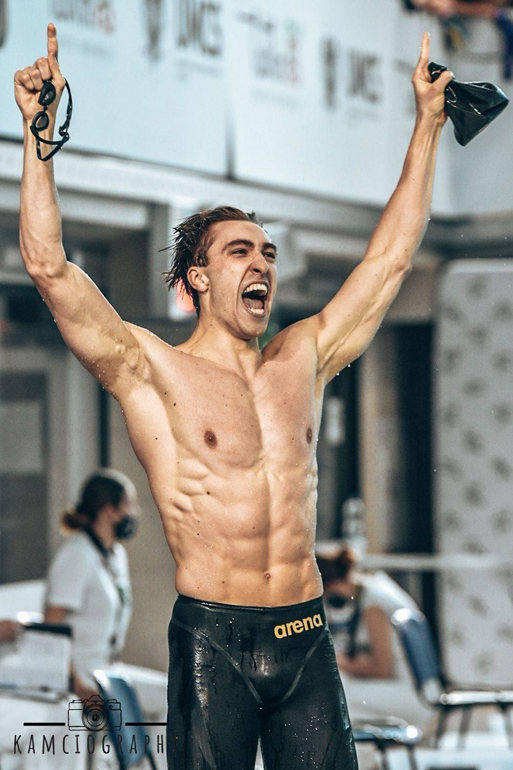
Please tell us what you did before you became an air traffic controller. You came to our university quite late. Did you devote 100% of your time to swimming and preparing for the Rio de Janeiro Olympics?
I trained for the Olympics, but it was a declining stage of my career – lacking fun or a positive boost. Before SGH, I studied transportation at the Warsaw University of Technology, but it wasn’t for me. I planned all sorts of things – including taking advantage of my swimming career to go to the United States to study there. That didn’t work out, but it coincided with me becoming an air traffic controller – and putting my swimming career on hold for a while. A great time to catch some breath!
Without a training regime…
Good times! But I’m a doer by nature, so after less than four years of rest, I got back on track. 2019 marks also the start of my full-time studies at SGH, returning to training, and a full-time job. As you can see, I had a pretty busy schedule…
To say the least! Tell us then, when did you decide you want to study at SGH? To be honest, it has nothing to do with aviation, swimming, or any of your passions.
I was a geography contest prize-winner and I heard that SGH endorsed non-academic passions!
Comparing our school to the Warsaw University of Technology, you can see clearly that we have it easier. Even the number of labs at SGH is much lower compared to the Warsaw University of Technology.
Exactly. So, could you resist the opportunity to get a higher education degree at the best school of economics in Poland?
Of course not. A degree from SGH is priceless, to say the least. Do you have an individual study programme?
No.
So, you just normally attend courses like everybody else?
Yes, but the instructors are very understanding and accommodating, and this applies to many courses. Especially those where attendance is mandatory. I get some advantages here, but when it comes to exams, I need to take them like everyone else.
What do you study?
Global Business, Finance, and Management.
Are the lectures and classes delivered in Polish or English?
I have a couple of courses taught in English but, in general, it’s a Polish-language field of study.
Finally, let’s talk about something that is my pet subject: academic sports. I say AZS, you say…?
Party! [laughs] Or let me maybe put it that way: you say AZS, I say AMP (University Championships of Poland – editor’s note).
So, what is AMP for you?
Good fun!
Is there a chance to see you participate in AMPs this year? The section is very much counting on you!
I know, it makes me very happy! We’ll see how it works out with my training schedule.
You get the idea – our reach grows when you compete!
That’s awesome! [laughs] Actually, I have yet to win an AMP gold medal!
So, you should take part by all means! You know, you don’t have to compete in 15 distances there, but at least in your go-to distance – go and get yourself (and us) some gold!
We’ll see what we can do.
Fingers crossed! If you need to reschedule an exam or anything else, we’ve got you covered. Just say a word!
Thanks, it’s always good to have such support!
Do you think that academic sports in Poland will ever be on a comparable level to that we can see in the United States?
I wish! But I really doubt that it could be possible… First of all, there are too few really committed people in Poland. Second, our higher education institutions are too ‘isolated’. For example, only if the University of Warsaw, the Warsaw University of Technology, and SGH Warsaw School of Economics merged could we talk of something equal-ish to, say, Stanford. Also, our sports culture is different. In the United States, there are talent scouts at every academic competition, waiting to ‘recruit’ top performers for professional sports. From there it’s on to the NBA, the NHL, all the major leagues.
Right. You can’t become a professional player there if you have not competed in academic games earlier.
Exactly! And there’s one more thing – in the United States, a single higher education institution has the budget of one major sports association…
You’re right, it’s a completely different scale. Thank you so much for the interview. I’m keeping my fingers crossed for future achievements and victories, and – most importantly – for a gold medal at AMPs!

